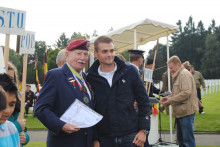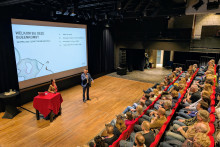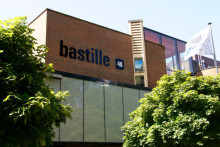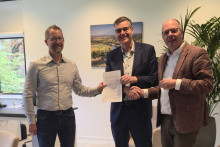It was in 2007 when he met a group of veterans in the bar of his hotel during a visit to Normandy. The business administration student immediately clicked with one veteran, an American, Bill Ryan. He told Max at length about his landing during D-Day. Following that one encounter, the two maintained contact. The veteran and the student wrote long letters to one another. 'Bill Ryan found it extraordinary that such a young person was so interested in his story', says Max. 'Over the years, he has sent me his memoirs, in which he told everything about the Normandy invasion. What I find extraordinary is that the 16th Infantry Regiment actually fought during the entire war. They were also one of the last regiments to return from the war and were the unit with the largest number of dead and wounded. They lost about 1300 men.'
6 June 1944
Bill Ryan was therefore the reason why Max became more and more absorbed in the 16th Infantry Regiment. 'I had always been very interested in the Second World War. As a child I read everything to do with the war: first Dutch books, then English ones. Later on, I watched the TV series Band of Brothers, which sparked my interest, especially for D-Day. From 2007 I started visiting Normandy, with all its museums and cemeteries, each year.'
Veteran Bill Ryan also told Max that he was one of the first soldiers to go ashore on 6 June 1944. 'As a result, I became more and more involved in the history of the 16th Infantry Regiment. Ryan is really the connection.'
Max and Bill have met several times. 'But unfortunately he died last February, when he was 90', says the student. 'That really upset me. We had developed a really special bond.' In November, the ashes of the American will be scattered on the beach in Normandy. 'I have been asked by his daughter to attend. A real honour.'
Adopted graves
During the years that Max had intensive contact with Bill, the idea developed to create a website about the 16th Infantry Regiment. The student received permission from the American veterans association and then together with two friends established the 'Stichting 16th Infantry Regiment Historical Society'. 'On the website you can find lots of information about the infantry, including photos. But most important is that we want to tell the stories of the soldiers, with the title 'A Soldier's Story'. To this end, I even sought cooperation with a secondary school in America.'
To find out the history, Max has commissioned a company in America to perform research for him. 'They scan documents in archives and then send them to me.' Clearly, this costs him a lot of money. 'Over the years I have spent thousands of dollars on this. All the money I earned was spent on these kinds of jobs.' In addition, he also adopted several graves of soldiers at military cemeteries. For the student, the coming few weeks will be dominated by visits to these graves to lay flowers. 'That is customary around Memorial Day, which is celebrated the end of May.' Together with his father, he recently went round collecting donations. 'So luckily I am now financially on firm ground for a while.'
What motivates him to continue? 'Sometimes I find it such a pity that my contemporaries hardly know what D-Day is or dwell on the meaning of 4 and 5 May. Therefore, I want to tell the stories of the soldiers who died for our freedom. And if you want something very much, then you will succeed.'







